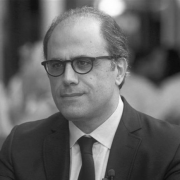Past Event
Financial inclusion of SMEs for growth and job creation
How can increased access to finance benefit SMEs? What reforms are needed to encourage SME financial inclusion?
video & audio recordings
summary
At this event we looked at how small and medium-sized enterprises’ (SMEs) financial inclusion is at the core of the economic diversification, growth, and job creation challenges many countries are facing.
This event featured the presentation of Financial inclusion of SMEs in the Middle East and Central Asia, a recent paper by the IMF, which discusses the macroeconomic benefits that could stem from improved access to finance for SMEs in these two regions, which lag behind other regions when it comes to SME access to finance. It also highlights the range of reforms needed to unlock SME financial inclusion—from macro-financial conditions and public sector size, to institutional and regulatory issues related to competition, credit information, property rights and solvency frameworks.
Jihad Azour provided the opening remarks on the inspiration for the project on financial inclusion of SMEs (small and medium-sized enterprises). The project wanted to focus on the following questions: How important is access to finance for SMEs to the economy? Is it macro relevant? How can the level of finance for SMEs be increased? What are the key bottle necks? How can access be mainstreamed at the country level?
They concluded that increasing financial access for SMEs would grow the economy and it will have a positive impact on employment. The project also looked at how, and especially in the Middle East, countries can scale up their support for SMEs. Azour also asserted that the demand for finance from SMEs is weak and they are not well prepared. In the future the project will look at financial support for SMEs from non-banking sources such as Fintech.
Anta Ndoye provided a presentation to discuss the project in more detail. Ndoye provided some stylized facts on SMEs such as SMEs represent over half of the total workforce in the private sector. Despite such presence of SMEs in the MENA (Middle East and North Africa) and CA (Central Asia) region only receive 7% of the bank credit. One main takeaway Ndoye highlighted from the project was that in the MENA and CA region increase finance to SMEs is estimated to lead to growth gains up to 1%. Ndoye then spoke on five key pillars to scale up financing for SMEs: Economic enablers, governance, financial infrastructure, economic competition, and business environment. Ndoye highlighted the role Fintech can play in increasing finance to SMEs by both enhancing tradition sources (credit information, real-time credit scores, competition) and by creating new channels (crowdfunding and peep-to-peer lending). Ndoye concluded that to increase SMEs financial inclusion a holistic policy approach is needed. This means an approach that considers business environment, political and macro stability, and institutions.
Going forward the project will focus on more granular and tailored advice for countries. It will also focus more on the demand side of financial access. The project is developing a SME financial inclusion toolkit, available within the next months, that will asses the state of SME financial inclusion, highlight the main drivers of SME financial inclusion gap, and identify the key policy priorities to scale up SME access to finance.
Barbara Marchitto spoke on work recently done at the EIB (European Investment Bank) that focused on the demand side of finance from SMEs. The key takeaways their research found were that the demand in the MENA region is weak, there are a large share of firms that exclude themselves from the formal financial sector — meaning they do not use banks including having a bank account. They found the lack of engagement with banks by SMEs were competition, collateral regimes, and the cost of formalization. They found that firms are more likely to engage with the banking sector when they are in areas where banks accept movable collateral, that less competition leads to less engagement with banks, and that firms that started as informalized and formalized later are also less likely to engage with banks.
The research also looked at human capital and found that entrepreneurs with university degrees were more likely to engage with the banking system. Therefore, firms that are managed by highly educated entrepreneurs have a better understanding of the costs of being exclude form the financial sector.
Bruno Balvanera spoke next about the ECRB’s (European Bank for Reconstruction and Development) five pillar approach for SMEs. The first pillar is to work through banks. Through the banks they are able to reach hundreds of thousands of SMEs on a yearly basis. The second pillar is risk sharing facility. This means the banks work with their clients but the ECRB will take on 50% of the risk. The third pillar is to work directly with SMEs. This third pillar is not as common as the previous two pillars. The fourth pillar is technical assistance to SMEs. The fifth pillar is about creating a business environment that benefits SMEs more.
Balvanera also highlighted the work the ECRB has done to empower women lead SMEs. The ECRB has also done special work with green SMEs and SMEs lead by young people. Azour spoke more on the topic of a holistic approach and stressed the importance of connectivity, understanding the specificity of needs for each SME because SMEs vary greatly, it is about the journey of going from an idea to reaching capital markets, both lack of supply and demand are there because of reasons such as environment and policies, technology and not only fintech is important, moving from pilot programs to scaling, and that everything is macro and everything is micro at the same time.
Both Azour and Balvanera pointed out that foreign (European) banks in the MENA and CA region have a small presence but intra-regional banks within this region are starting to develop, the Turkish banks in particular bring value added to SMEs.
Notes by Akira Soto
materials
Schedule
12:30-13:00
Check-in and lunch
13:00-13:05
Welcome
Guntram B. Wolff, Former Director
13:05-13:10
Introduction
Jihad Azour, Director of the Middle East and Central Asia Department, IMF
13:10-13:25
Presentation of report
13:25-14:15
Panel discussion
Chair: Zsolt Darvas, Senior Fellow
Jihad Azour, Director of the Middle East and Central Asia Department, IMF
Bruno Balvanera, Managing Director Central Asia, European Bank for Reconstruction and Development
Barbara Marchitto, Head of Country and Financial Sector Analysis Division, European Investment Bank (EIB)
14:15-14:30
Q&A
14:30
End
Speakers

Jihad Azour
Director of the Middle East and Central Asia Department, IMF

Bruno Balvanera
Managing Director Central Asia, European Bank for Reconstruction and Development

Zsolt Darvas
Senior Fellow

Barbara Marchitto
Head of Country and Financial Sector Analysis Division, European Investment Bank (EIB)
A Ndoye

Guntram B. Wolff
Former Director
Location & Contact
Matilda Sevon
[email protected]
